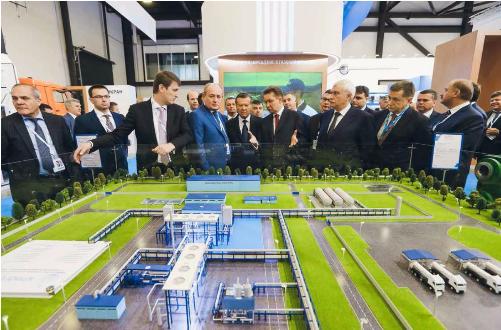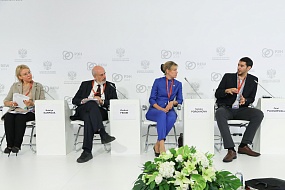REW Club: Sanctions and Speculation Curb Global Gas Consumption Growth

Tehran, 22 May – The
establishment of autonomous institutions in the finance, insurance, and market regulation
sectors, modelled after OPEC+, will significantly increase global gas
consumption, with a particular emphasis on Asian markets. That’s according to
experts at the Russian Energy Week (REW) club.
“It sounds complicated, but
the creation of an independent environment, protected from sanctions or
attempts to artificially regulate prices, with long-term relations between
exporters and consumers, will significantly boost investment, production, and
gas consumption. Consequently, this will lead to a reduction in CO2 emissions,”
said Leonid Krutakov, Associate Professor at the Financial University under the
Government of the Russian Federation.
The REW Club meeting was held
in the framework of the Iran Oil Show 2023 with the support of the Institute
for International Energy Studies of Iran.
According to experts, such
institutions could be a part of the SCO or BRICS, whose gas consumption needs
are projected to grow significantly in the next 20–30 years. However,
currently, they are somewhat constrained by the lack of sufficient
infrastructure and the limited availability of free resources on the world
market.
“The SCO and BRICS are unique
in that they unite the world's largest consumers and producers. Consequently,
this presents the opportunity to ensure long-term guarantees for investment,
production, consumption, and a system of mutual settlements. Such measures will
lay the foundation for the establishment of a sustainable market structure,”
said Sergey Kapitonov, an analyst at the Project Center for Energy Transition
and ESG at Skoltech.
In addition, considering the
expansion prospects of the SCO and BRICS, the member countries of these
organizations are expected to possess over 40 per cent of the world's proven
gas reserves, which are geographically compact.
According to the Gas Exporting
Countries Forum (GECF), there is a long-term forecast projecting a 36 per cent
increase in global demand for natural gas by 2050 in comparison to 2021 levels,
reaching 1,435 billion cubic metres.
By 2050, the growth leaders in
energy consumption are projected to be Asia-Pacific (+78 per cent), the Middle
East (+60 per cent), and Africa (+152 per cent). According to the FSEG, in
Latin America, gas consumption is expected to double, while in Europe, it is
anticipated to fall by 37 per cent.
“The growth figures could be
even higher if the market becomes more predictable for consumers. If prices
jump to USD 2,000–3,000 per thousand cubic meters of gas, it is unlikely that
any country will orient its national economy towards gas consumption.
Similarly, producers find it challenging to plan investments in production,
processing, and transport infrastructure when market prices can fall to USD
50–100 per thousand cubic meters, as witnessed during the height of the 2020
quarantines,” said Alexei Grivach, deputy director general of the National
Energy Security Fund.
There are always alternatives
available on the market. Currently, coal remains a cheaper and more accessible
option, even for EU countries, which recently shut down and then, during the
energy crisis, increased generation from coal-fired power plants. However,
switching from coal to gas will almost halve greenhouse gas emissions, all
while ensuring a secure energy supply.
Furthermore, with the world's proven natural gas reserves being nearly fifty times higher than the current production rate, this commodity is expected to continue its appeal to various sectors of the economy, such as transportation and the chemical industry.
REW Club is a discussion platform of the international forum Russian Energy Week for the expert community, scientists, as well as analysts and management of energy companies.





